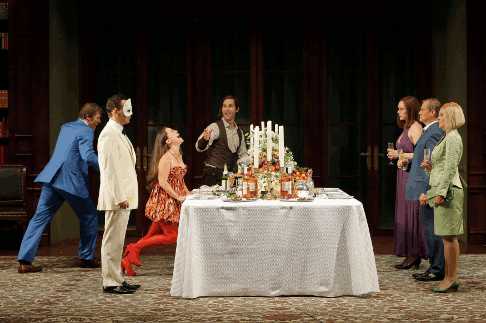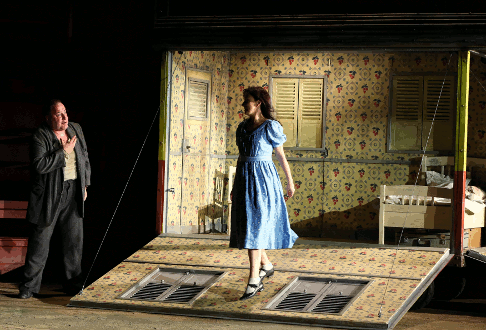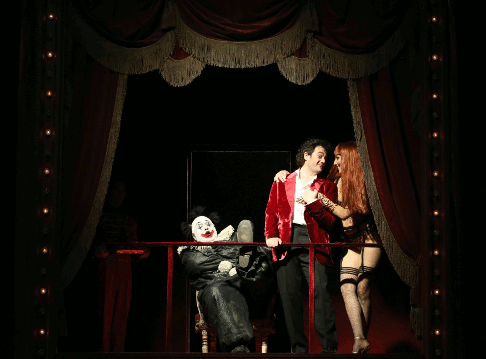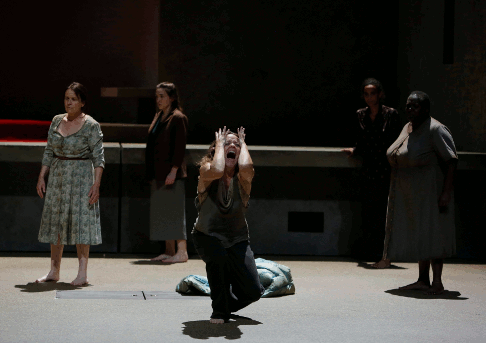![Scene from Elektra [Photo by Pascal Victor/ArtComArt]](http://www.operatoday.com/ELEKTRA%20807.gif)
30 Jul 2013
The Aix Festival 2013
Don Giovanni — the coup de coeur. Elektra — a masterpiece. Rigoletto — a hit and a miss.
English Touring Opera are delighted to announce a season of lyric monodramas to tour nationally from October to December. The season features music for solo singer and piano by Argento, Britten, Tippett and Shostakovich with a bold and inventive approach to making opera during social distancing.
This tenth of ten Live from London concerts was in fact a recorded live performance from California. It was no less enjoyable for that, and it was also uplifting to learn that this wasn’t in fact the ‘last’ LfL event that we will be able to enjoy, courtesy of VOCES8 and their fellow vocal ensembles (more below …).
Ever since Wigmore Hall announced their superb series of autumn concerts, all streamed live and available free of charge, I’d been looking forward to this song recital by Ian Bostridge and Imogen Cooper.
Although Stile Antico’s programme article for their Live from London recital introduced their selection from the many treasures of the English Renaissance in the context of the theological debates and upheavals of the Tudor and Elizabethan years, their performance was more evocative of private chamber music than of public liturgy.
Evidently, face masks don’t stifle appreciative “Bravo!”s. And, reducing audience numbers doesn’t lower the volume of such acclamations. For, the audience at Wigmore Hall gave soprano Elizabeth Llewellyn and pianist Simon Lepper a greatly deserved warm reception and hearty response following this lunchtime recital of late-Romantic song.
For this week’s Live from London vocal recital we moved from the home of VOCES8, St Anne and St Agnes in the City of London, to Kings Place, where The Sixteen - who have been associate artists at the venue for some time - presented a programme of music and words bound together by the theme of ‘reflection’.
'Such is your divine Disposation that both you excellently understand, and royally entertaine the Exercise of Musicke.’
‘And there was war in heaven: Michael and his angels fought against the dragon; and the dragon fought and his angels, And prevailed not; neither was their place found any more in heaven … that old serpent … Satan, which deceiveth the whole world: he was cast out into the earth, and his angels were cast out with him.’
There was never any doubt that the fifth of the twelve Met Stars Live in Concert broadcasts was going to be a palpably intense and vivid event, as well as a musically stunning and theatrically enervating experience.
‘Love’ was the theme for this Live from London performance by Apollo5. Given the complexity and diversity of that human emotion, and Apollo5’s reputation for versatility and diverse repertoire, ranging from Renaissance choral music to jazz, from contemporary classical works to popular song, it was no surprise that their programme spanned 500 years and several musical styles.
The Academy of St Martin in the Fields have titled their autumn series of eight concerts - which are taking place at 5pm and 7.30pm on two Saturdays each month at their home venue in Trafalgar Square, and being filmed for streaming the following Thursday - ‘re:connect’.
The London Symphony Orchestra opened their Autumn 2020 season with a homage to Oliver Knussen, who died at the age of 66 in July 2018. The programme traced a national musical lineage through the twentieth century, from Britten to Knussen, on to Mark-Anthony Turnage, and entwining the LSO and Rattle too.
With the Live from London digital vocal festival entering the second half of the series, the festival’s host, VOCES8, returned to their home at St Annes and St Agnes in the City of London to present a sequence of ‘Choral Dances’ - vocal music inspired by dance, embracing diverse genres from the Renaissance madrigal to swing jazz.
Just a few unison string wriggles from the opening of Mozart’s overture to Le nozze di Figaro are enough to make any opera-lover perch on the edge of their seat, in excited anticipation of the drama in music to come, so there could be no other curtain-raiser for this Gala Concert at the Royal Opera House, the latest instalment from ‘their House’ to ‘our houses’.
"Before the ending of the day, creator of all things, we pray that, with your accustomed mercy, you may watch over us."
The doors at The Metropolitan Opera will not open to live audiences until 2021 at the earliest, and the likelihood of normal operatic life resuming in cities around the world looks but a distant dream at present. But, while we may not be invited from our homes into the opera house for some time yet, with its free daily screenings of past productions and its pay-per-view Met Stars Live in Concert series, the Met continues to bring opera into our homes.
Music-making at this year’s Grange Festival Opera may have fallen silent in June and July, but the country house and extensive grounds of The Grange provided an ideal setting for a weekend of twelve specially conceived ‘promenade’ performances encompassing music and dance.
There’s a “slide of harmony” and “all the bones leave your body at that moment and you collapse to the floor, it’s so extraordinary.”
“Music for a while, shall all your cares beguile.”
The hum of bees rising from myriad scented blooms; gentle strains of birdsong; the cheerful chatter of picnickers beside a still lake; decorous thwacks of leather on willow; song and music floating through the warm evening air.
![Scene from Elektra [Photo by Pascal Victor/ArtComArt]](http://www.operatoday.com/ELEKTRA%20807.gif)
Don Giovanni — the coup de coeur. Elektra — a masterpiece. Rigoletto — a hit and a miss.
Don Giovanni as envisioned by director Dimitri Tchneriakov was first seen at the Aix Festival’s Archevêché theater in 2010. It created a sensation, and scandal in some quarters as do many Tchneriakov mises en scène. Don Giovanni was a somewhat sympathetic drunk who accommodated the sexual needs of a complicated household (in Tchneriakov’s Don Giovanni everyone is related or about to be, except Leporello).
It was a splendid production, conducted by Louis Langrée, music director of Lincoln Center’s Mostly Mozart, with the period resources of the Freiburg Baroque Orchestra. It was a musically vivid if unique, far out take on the legend as told in the opera. A feeling of déja vu anticipated the revival, enough was enough. And besides it seemed only a couple of years since its premiere. It was too soon for the same thing.
Until the curtain rose. The same set, only a different atmosphere, now the silence of a funeral home, the formality of a law court. Then the downbeat. One of the hallmarks of the original production was the crashing of a show curtain to separate, or punctuate scenes and establish a precise time sequence (and, well, to take the place of a whole lot of recitative). In 2010 the moments in time were demurely indicated in French. Now, somehow, the crash was more brutal, the time indications were suddenly boldly typed out, in French and then in English. Sans serif.
The Don stumbled out of Donna Anna’s bedroom, crashed to the floor, dead drunk and he remained drunk for the several month duration of Tchneriakov’s action. American bass baritone Rod Gilfry who not so long ago was the St. Francis in Amsterdam embodied the Don. Mr. Gilfry is the charismatic performer ne plus ultra. Thus we were solidly in the presence of a drunk, a man useless to the world. We were not the only ones. The entire cast of well-known characters had lost patience with him, and finally sat at a grim household council to determine how to rid themselves of the problem. Giovanni himself solved the problem, he simply drank himself to death — il dissoluto punito!
 A scene from Don Giovanni
A scene from Don Giovanni
No one particularly cared, except maybe Zerlina just a bit. After all he was no longer Don Ottavio’s more virile competition nor was he Masetto’s richer competition. These two, usually losers, reached a virile standoff at Giovanni’s Act I party that had nothing to do with the kiss they exchanged during the opera’s Act II finale in 2010. Ottavio now in fact had some real coglioni. Elvira was perfectly happy, in fact relieved to be passed off to Leporello in the complex serenade escapade. Anna and Ottavio had a little flirtatious moment after the Don’s demise and the opera ended.
This time it was the London Symphony Orchestra and conductor Marc Minkowski, a maestro of impeccable early music credential. There was a suavity of sound, an amplitude of color that only a fine modern symphony orchestra achieves. It was urged on by this once early music maestro who in recent years has taken on the gamut of colorful nineteenth and twentieth century repertory, and now maybe has left earth as well.
The maestro brought forth sugary sweet, sometimes incoherent sounds from the pit that created a sort of alcoholic musical haze through which a wacko continuo pounded. There was indifference to the often separate sonic worlds of the pit and stage, and the maestro seemed to be confusing conducting with arm flailing.
You surely understand by now that all this was art at its most sublime. It was the sequel, hardly the repeat of the brilliant 2010 Tchneriakov Don Giovanni. It had to be seen to be believed, Mozart’s Don Giovanni was not deconstructed, but Don Giovanni destructed as is, in fact, the intention of the opera. We all bought it with minimum booing.
As had been in 2010 the casting for the new Tcherniakov and Minkowski vision was impeccable, bass baritone Kyle Kettleman the only hold over, bridging with sensitivity and subtle emotional understanding the decline of his boss. Arias were sometimes whispered, sometimes almost spoken, never fully sung. Ensembles were dramatically inverted. The new Donna Elvira had withdrawn (no explanation given), and was replaced for the first four performances by the 2010 Elvira, Latvian soprano Kristine Opolais and for the final four performances by Romanian soprano Alex Penda (lately known as Alexandrina Pendatchanska) who oozed Slavic disgust for her no-account husband (the Don).
There used to be an adage in the opera business — don’t mess with Verdi. Another adage was don’t produce Verdi if you don’t have the voices. But a few generations of new age directors have changed all that. Blame it on Jonathan Miller with his mafia Rigoletto, blame it on Calixto Bieito with his toilets in Un ballo in maschera, both emblematic new age productions of Verdi.
The wisdom of the ages still stands of course, but if you invite famous director Robert Carson to stage Rigoletto you take what the latest in operatic thinking gives you. To wit, a big confusion with the equally famous jester in I pagliacci, plus a relentless big top metaphor that offered a myriad of possibilities for creating stage excitement (acrobats, contortionists, a lion tamer [with eight or so scantily clad females (a few square centimeters of faux lion skin], the ninth was the Countess Ceprano, all of whom willing to go topless). Plus the ring master (the Duke of Mantua) willing to take it all off.
 A scene from Rigoletto
A scene from Rigoletto
Young, reasonably fit Mexican baritone Arturo Chacón Cruz was the Duke of Mantua. His youth ensures powerful and secure high notes though his vocal production seems to preclude forming words. He projects youth and energy and even some charm, though no sweetness or delicacy, and no musical or vocal sophistication. Mr. Chacón Cruz is however experienced in the big-top metaphor having recently played Werther in circus language in Lyon (it worked a bit better for Werther there than for Rigoletto here).
Soprano Irina Lungu was the alternate Violetta to Natalie Dessay’s recent La Traviata in Aix. Russian born and trained, extensively schooled in Italy this young diva has secure above the staff capabilities though her voice sits more expressively in the full lyric range. Mlle. Lungu is indeed highly schooled, her Gilda created by exploiting style without plumbing sincerity either vocally or dramatically.
Georgian baritone George Gagnidze sang Rigoletto, his signature role that he has taken to the world’s major stages (in the U.S. at the Met and in L.A.). His is a consummate Rigoletto combining beauty and power of voice with a seemingly natural inclination to negotiate the emotional poles of the Rigoletto character. Much of this Rigoletto however disappeared amid the clamor of the big-top metaphor.
Robert Carson typically avails himself of fine designers, here the husband and wife team Radu and Boruzescu of Bulgarian origin who have made their professional lives in France. it is a big-top of long-ago atmospheres, colors that are emotional and shapes that are storybook traditional. The grandstands are steep thus adding a vertical plain to the staging surfaces. With consummate directorial skill Carson used every inch of the horizontal and vertical spaces to create stage pictures, including to highest reaches of the big-top for a floating trapeze swing from which Gilda sang her “Caro nome.”
The richness of directorial and scenic possibilities afforded by the metaphor however sabotaged Carson. His tricky staging failed to ignite the emotional lives of his protagonists, including, most harmfully, the courtiers of Verdi’s crucial Rigoletto chorus. Not that this seemed to bother enthusiastic audiences.
Italian conductor Gianandrea Noseda sometimes allowed his orchestra, the London Symphony to be covered by staging noises, and other times, too often, indulged in exploring and exploiting the sophistication of sound that has made this superb symphony orchestra famous. The Verdi orchestra however is purely dramatic, not an end in itself. It is a dominant player in Verdi’s tightly complex opera organism. Noseda did not and this orchestra could not fulfill their roles in Aix.
 A scene from Rigoletto
A scene from Rigoletto
Don’t mess with Verdi.
Rarely in the annals of opera do forces converge to create a masterpiece. But this occurred just now in Aix. And no surprise. Patrice Chéreau created the stage and Esa-Pekka Salonen created the pit for the Strauss Elektra with extraordinary German soprano Evelyn Herlitzius.
The fire curtain rose to reveal a silence hanging over the minimally shaped classical architectural forms of the set. Von Hofmannsthal’s maids began sweeping and scrubbing the floors. The sounds of the broom, the running of water to fill pails slowly became apparent, even loud, focusing our attention on detail, smallest detail. It was to be an Elektra discovered through microscopic dramaturgical detail.
All hell broke loose in the pit, murdered Agamemnon the dominant musical force of the evening. The servants spread realistically throughout the courtyard discussed palace life. Their individual personalities were perceived by a striking diversity of age, body type and race, the “real” made more so by precise and complex staging, like the music. Real as well was the detail of the costume, vaguely middle European, vaguely mid-twentieth century, the socialist grit and survival feel against which all life must play.
Elektra rendered her opening monologue in stately, mythic terms of pre-written destiny, her idée fixe — the duty of her brother Orest to reek vengeance on their mother Clytemnestra for the murder of their father, Agamemnon. Chéreau’s Clytemnestra was soprano[!] Waltraud Meier, possessed also of her idée fixe — her fear of being killed by her son. Mme. Meier possesses a delicate persona making a vulnerable Clytemnestra. She was a personage and voice much reduced in magnitude from the usual monster.
She was visually and vocally neurotic rather than evil (after all she did have a justifiable reason to kill her husband). Elektra in fact actually embraced her mother during Clytemnestra’s monologue of fear, a coup de théâtre not withstanding its deeply human motivation. A second coup soon followed— Orest and his tutor ceremoniously entered the courtyard (unnoticed by Clytemnestra and Elektra) just as the Clytemnestra confession was concluding, adding frightening layers of now palpable physical threat.
Chrysothemis, sung by Canadian soprano Adrianne Pieczonka, was of substantial personality and force, the only being on the stage who could see beyond the murder of Agamemnon. Of a vocal magnitude nearly parallel to that of Mme. Herlitzius Chrysothemis competed vocally with Elektra offering life instead of death.
Orest, Russian bass Mikhail Petrenko, held back from revealing himself to Elektra, the scene staged with Elektra blind to his presence. At this point we were somehow inside Elektra but deprived of understanding this reaction to her brother. Orest too was possessed by duty, his idée fixe, that in fact destroyed him emotionally (killing his mother). His beaten form was made visible to us as he walked slowly off the stage during Elektra’s dance.
 A scene from Elektra
A scene from Elektra
Finally Chéreau left Elektra exhausted, sitting on a ledge, and we saw the tragedy not only as that of Elektra but of Orest as well, and of Clytemnestra who lay there dead, murdered by her son.
Conductor Esa-Pekka Salonen used the considerable resources of the Orchestre de Paris, 110 players (68 strings) to tell the Chéreau story. Nothing happened on the stage that did not happen in the pit, with the same intelligence of detail. The dissection of the Von Hofmannsthal libretto was echoed in Salonen’s immersion into the Strauss score, taking it well beyond what you may have perceived before. The delicacy of the chamber orchestra that Strauss inserted inside his massive instrumental forces was notably absent, having disappeared into this fortissimo colossus of neurosis and humanity.
The title is Elektra, she was 50 year-old Evelyn Herlitzius, who took the stage with the palpable energy of a post-adolescent and of voice that shown at momentous times with the beauty of youth. Mme. Herlitzius will have challenged Chéreau and Salonen to make use of these attributes. It is impossible to imagine this production without this phenomenal artist of unceasing physical and vocal stamina. The production now goes to Milan, Helsinki, Barcelona and Berlin with most of this same cast. Casting will be modified when it comes to the Met — a different Elektra most significantly).
Michael Milenski
For an account by Michael Milenski of the two smaller operas of the Aix Festival 2013, please see Elena and The House Over Taken at www.OperaToday.com
Casts and Production:
Don Giovanni
Don Giovanni: Rod Gilfry; Leporello: Kyle Ketelsen; Donna Anna: Maria Bengtsson; Don Ottavio; Paul Groves; Donna Elvira: Alex Penda; Zerlina: Joelle Harvey; Masetto; Kostas Smoriginas; Il Commendatore; Anatoli Kotscherga. The Estonian Philharmonic Chamber Choir. The London Symphony Orchestra conducted by Marc Minkowski; Mise en scène et scénographie: Dimitri Tcherniakov; Costumes: Dmitri Tcherniakov and Elena Zaytseva; Lighting: Gleb Filshtinsky. Théâtre de l’Archevêche, Aix-en-Provence, July 18, 2013.
Rigoletto
Rigoletto: George Gagnidze; Gilda: Irina Lungu; Il Duca di Mantova: Arturo Chacon Cruz; Sparafucile: Gábor Bretz; Maddalena: José Maria Lo Monaco; Giovanna: Michèle Lagrange; Il Conte di Monterone: Wojtek Smilek; Borsa: Julien Dran; Marullo: Jean-Luc Ballestra; Il Conte di Ceprano: Maurizio Lo Piccolo; La Contessa di Ceprano: Valeria Tornatore. The Estonian Philharmonic Chamber Choir. The London Symphony conducted by Gianandrea Noseda. Mise en scène: Robert Carsen; Scenery: Radu Boruzescu; Costumes: Miruna Boruzescu; Lighting: Robert Carsen and Peter van Praet
Chorégraphie: Philippe Giraudeau. Théâtre de l’Archevêche, Aix-en-Provence, July 24, 2013.
Elektra
Elektra: Evelyn Herlitzius; Klytämnestra: Waltraud Meier; Chrysothemis: Adrianne Pieczonka; Orest: Mikhail Petrenko; Aegisth: Tom Randle; Der Pfleger des Orest: Franz Mazura; Ein junger Diener: Florian Hoffmann; Ein alter Diener: Sir Donald McIntyre; Die Aufseherin/Die Vertraute: Renate Behle; Erste Magd: Bonita Hyman; Zweite Magd/Die Schleppträgerin: Andrea Hill; Dritte Magd: Silvia Hablowetz; Vierte Magd: Marie-Eve Munger; Fünfte Magd: Roberta Alexander. Coro Gulbenkian. The Orchestre de Paris conducted by Esa-Pekka Salonen. Mise en scène: Patrice Chéreau; Scenery: Richard Peduzzi; Lighting: Dominique Bruguière; Costumes: Caroline de Vivaise. The Grand Théâtre de Provence, Aix-en-Provence, July 19, 2013.